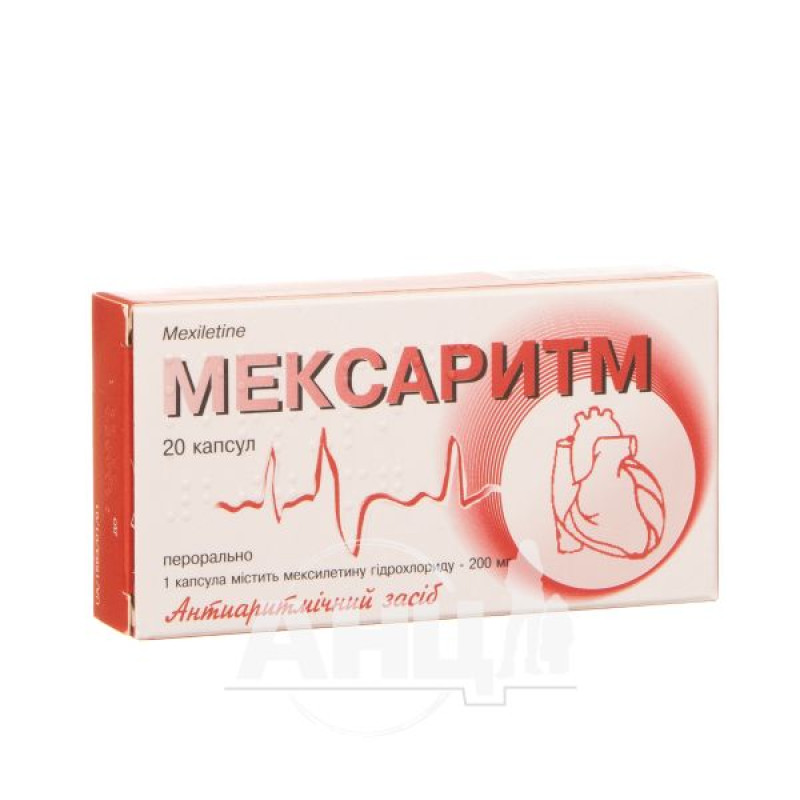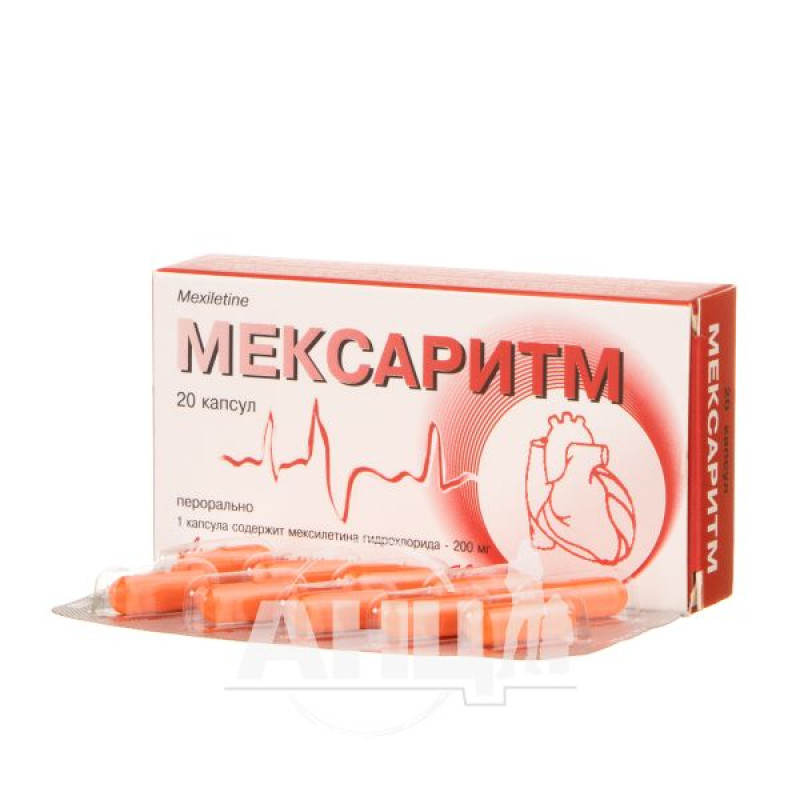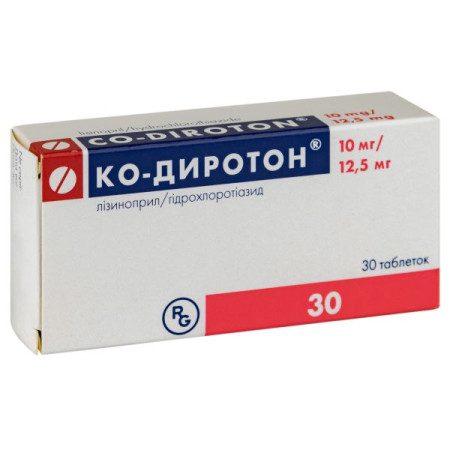Meksarithm capsules 200 mg No. 20

Pharmacological properties
Mexiletine hydrochloride belongs to class IV antiarrhythmic drugs. It slows down the rapid transmembrane flow of sodium ions, has a membrane-stabilizing and local anesthetic effect. The drug reduces the rate of depolarization and automaticity of pacemakers, the rate of excitation in His-Purkinje fibers, slightly reduces the effective refractory period and to a greater extent the duration of the action potential (AP), increases the ratio of the effective refractory period to the duration of the AP. Mexiletine has little effect on hemodynamic parameters.
Mexiletine hydrochloride is rapidly absorbed in the digestive tract. It binds to blood plasma proteins by 50-60%. 85% of mexiletine hydrochloride is metabolized in the liver with the formation of inactive metabolites. It is excreted mainly with bile and only 10-15% is excreted in the urine unchanged. The half-life is on average 11 hours (8-14 hours), in heart failure or impaired liver function it can be extended to 25 hours, in acute myocardial infarction - up to 15-17 hours, and in severe renal failure it increases by 30-35%. The drug penetrates the placenta and enters breast milk.
Indication
Prevention and treatment of ventricular extrasystoles, ventricular tachyarrhythmias.
Application
Inside, first 400 mg, then 200 mg every 6-8 hours. It is possible to prescribe the drug 200-300 mg 3 times a day, if necessary, the dose is increased by 50-150 mg every 3 days. The maximum daily dose is 800 mg, with renal failure - no more than 600 mg. In some cases, a single dose has to be increased to 600 mg. In the future, depending on the therapeutic effect, the dose can be gradually reduced. The duration of treatment depends on the severity and course of the disease. The capsule is swallowed whole, without chewing, with water.
Contraindication
Hypersensitivity to the drug, sinus node weakness, bradycardia, hypotension, cardiogenic shock, acute renal or hepatic failure, pregnancy, childhood. When prescribing the drug during lactation, it is necessary to decide on the termination of breastfeeding.
Side effects
Possible changes in taste sensations, nausea, vomiting, diarrhea, constipation, nystagmus, accommodation disorders, ataxia, dysarthria, tremor, paresthesia, drowsiness, confusion, dizziness. In some cases, the drug can cause bradycardia, hypotension, dermatitis, urinary disorders, psychosis, convulsions. Arrhythmogenic effect (development of ventricular extrasystoles, atrial fibrillation) is not excluded.
Special instructions
Due to the possibility of developing life-threatening arrhythmias, discontinuation of the drug is carried out in a hospital setting. Sudden withdrawal of Mexaritm is life-threatening, so the dose must be reduced gradually. When switching from lidocaine treatment to Mexaritm treatment, the lidocaine infusion must be stopped immediately after the first dose of Mexaritm is taken, and the system for IV administration of lidocaine is disconnected from the patient only after achieving a satisfactory antiarrhythmic effect with the use of Mexaritm.
The drug is prescribed with caution to patients with myasthenia gravis, epilepsy, mental illnesses; bradycardia, hypotension, heart failure; liver or kidney diseases. Mexaritm increases the symptoms and severity of Parkinson's disease. During treatment with Mexaritm, you should refrain from driving vehicles and working with potentially dangerous mechanisms. There is no experience with the use of the drug in children.
Interactions
Narcotics, sedatives and ganglioblockers, antacids, metoclopramide, anticholinergics, H2-histamine blockers slow down the absorption of Mexaritm, β-adrenoceptor blockers, calcium antagonists - binding to blood plasma proteins. Rifampicin, phenytoin and barbiturates accelerate the metabolism of the drug, reduce its concentration in the blood. Sodium bicarbonate and diuretics slow down the excretion of Mexaritm by the kidneys, increasing its concentration in the blood plasma. With the combined use of the drug with β-adrenoceptor blockers, membrane stabilizers, an increase in the antiarrhythmic effect is observed; with lidocaine and other local anesthetics - the risk of Mexaritm cumulation increases.
Overdose
Manifested by nausea, vomiting. Possible diarrhea, constipation, drowsiness, hypotension, proarrhythmic effect. It is necessary to wash the stomach, prescribe activated charcoal. Treatment is symptomatic.
Storage conditions
In a dry, dark place at a temperature of 15-25 ° C. Shelf life - 2 years.
There are no reviews for this product.
There are no reviews for this product, be the first to leave your review.
No questions about this product, be the first and ask your question.








